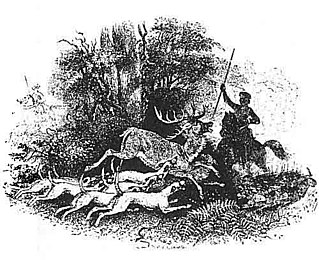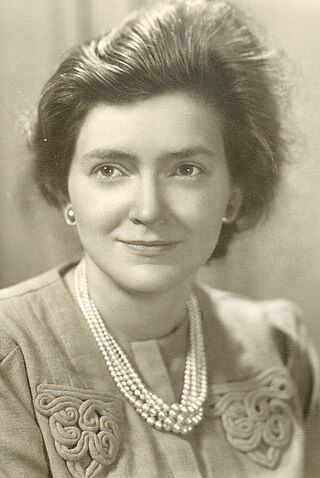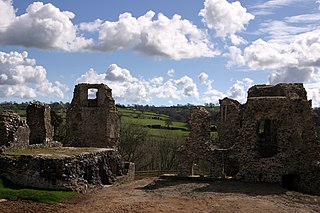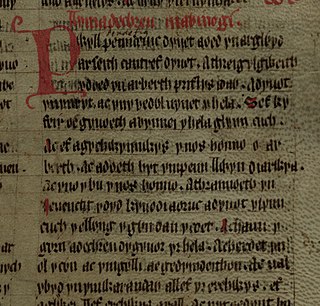Manawydan fab Llŷr is a figure of Welsh mythology, the son of Llŷr and the brother of Brân the Blessed and Brânwen. The first element in his name is cognate with the stem of the name of the Irish sea god Manannán mac Lir, and likely originated from the same Celtic deity as Manannán. Unlike Manannán, however, no surviving material connects him with the sea in any way except for his patronymic. Manawydan's most important appearances occur in the Second and Third Branches of the Mabinogi, but he is also referenced frequently in medieval poetry and the Welsh Triads.

Pryderi fab Pwyll is a prominent figure in Welsh mythology, the son of Pwyll and Rhiannon, and king of Dyfed after his father's death. He is the only character to appear in all Four Branches of the Mabinogi, although the size of his role varies from tale to tale. He is often equated with the divine son figure of Mabon ap Modron, while Jeffrey Gantz compares him to Peredur fab Efrawg, who is himself associated with the continental figure of Sir Percival de Galles.

Pwyll Pen Annwn is a prominent figure in Welsh mythology and literature, the lord of Dyfed, husband of Rhiannon and father of the hero Pryderi. Meaning ''wisdom" he is the eponymous hero of Pwyll Pendefig Dyfed, the first branch of the Four Branches of the Mabinogi, and also appears briefly as a member of Arthur's court in the medieval tale Culhwch ac Olwen. Pwyll, Prince of Dyfed also carries many similarities to the Mabinogi Branwen.

Rhiannon is a major figure in the Mabinogi, the medieval Welsh story collection. She appears mainly in the First Branch of the Mabinogi, and again in the Third Branch. She is a strong-minded Otherworld woman, who chooses Pwyll, prince of Dyfed, as her consort, in preference to another man to whom she has already been betrothed. She is intelligent, politically strategic, beautiful, and famed for her wealth and generosity. With Pwyll she has a son, the hero Pryderi, who later inherits the lordship of Dyfed. She endures tragedy when her newborn child is abducted, and she is accused of infanticide. As a widow she marries Manawydan of the British royal family, and has further adventures involving enchantments.
In Pwyll Pendefig Dyfed, the first branch of the Mabinogi, Hefeydd Hen was the father of Rhiannon.
In Welsh mythology, Gwawl was the son of Clud, and tricks Pwyll into promising him Rhiannon. She decides to marry Pwyll instead. Nothing is known of his father Clud.
Modron ("mother") is a figure in Welsh tradition, known as the mother of the hero Mabon ap Modron. Both characters may have derived from earlier divine figures, in her case the Gaulish goddess Matrona. She may have been a prototype for Morgan le Fay from the Arthurian legend.
Euroswydd is a figure in Welsh mythology, the father of Nisien and Efnysien by Penarddun, daughter of Beli Mawr. In the Second Branch of the Mabinogi Penarddun is the wife of Llŷr, by whom her children are Brân, Branwen, and Manawydan. The circumstances of Nisien and Efnysien's conception are not described, but one of the Welsh Triads mentions that Euroswydd had held Llŷr captive as one of the Three Exalted Prisoners of the Island of Britain; it is likely the traditions are connected.
Cigfa ferch Gwyn Glohoyw is a minor character in Welsh mythology, the wife of King Pryderi of Dyfed. She is mentioned briefly in the First Branch of the Mabinogi, and appears more prominently in the third. Describing the character, Proinsias Mac Cana writes: "Cigfa strikes one as a slight though effective vignette of a contemporary bourgeois snob while William John Gruffydd hypothesises that the character was a later addition to the tale." John Rhys suggested a connection between Cigfa and the Irish character Ciochba.

The Mabinogion are the earliest Welsh prose stories, and belong to the Matter of Britain. The stories were compiled in Middle Welsh in the 12th–13th centuries from earlier oral traditions. There are two main source manuscripts, created c. 1350–1410, as well as a few earlier fragments. The title covers a collection of eleven prose stories of widely different types, offering drama, philosophy, romance, tragedy, fantasy and humour, and created by various narrators over time. There is a classic hero quest, "Culhwch and Olwen"; a historic legend in "Lludd and Llefelys," complete with glimpses of a far off age; and other tales portray a very different King Arthur from the later popular versions. The highly sophisticated complexity of the Four Branches of the Mabinogi defies categorisation. The stories are so diverse that it has been argued that they are not even a true collection.

Welsh mythology consists of both folk traditions developed in Wales, and traditions developed by the Celtic Britons elsewhere before the end of the first millennium. As in most of the predominantly oral societies Celtic mythology and history were recorded orally by specialists such as druids. This oral record has been lost or altered as a result of outside contact and invasion over the years. Much of this altered mythology and history is preserved in medieval Welsh manuscripts, which include the Red Book of Hergest, the White Book of Rhydderch, the Book of Aneirin and the Book of Taliesin. Other works connected to Welsh mythology include the ninth-century Latin historical compilation Historia Brittonum and Geoffrey of Monmouth's twelfth-century Latin chronicle Historia Regum Britanniae, as well as later folklore, such as the materials collected in The Welsh Fairy Book by William Jenkyn Thomas (1908).

Evangeline Walton was the pen name of Evangeline Wilna Ensley, an American writer of fantasy fiction. She remains popular in North America and Europe because of her “ability to humanize historical and mythological subjects with eloquence, humor and compassion”.
The Four Branches of the Mabinogi or Pedair Cainc Y Mabinogi are the earliest prose stories in the literature of Britain. Originally written in Wales in Middle Welsh, but widely available in translations, the Mabinogi is generally agreed to be a single work in four parts, or "branches." The interrelated tales can be read as mythology, political themes, romances, or magical fantasies. They appeal to a wide range of readers, from young children to the most sophisticated adult. The tales are popular today in book format, as storytelling or theatre performances; they appear in recordings and on film, and continue to inspire many reinterpretations in artwork and modern fiction.

Preiddeu Annwfn or Preiddeu Annwn is a cryptic poem of sixty lines in Middle Welsh, found in the Book of Taliesin. The text recounts an expedition with King Arthur to Annwfn or Annwn, the Welsh name for the Celtic Otherworld.

Robin Duncan Harry Williamson is a Scottish multi-instrumentalist, singer, songwriter, and storyteller who was a founding member of The Incredible String Band.

Narberth Castle is a ruined Norman fortress in the town of Narberth, Pembrokeshire, West Wales. It forms part of the Landsker Line.

Pwyll Pendefig Dyfed, "Pwyll, Prince of Dyfed," is a legendary tale from medieval Welsh literature and the first of the Four Branches of the Mabinogi. It tells of the friendship between Pwyll, prince of Dyfed, and Arawn, lord of Annwn, of the courting and marriage of Pwyll and Rhiannon and of the birth and disappearance of Pryderi. This branch introduces a number of storylines that reappear in later tales, including the alliance between Dyfed and Annwn, and the enmity between Pwyll and Gwawl. Along with the other branches, the tale can be found in the medieval Red Book of Hergest and White Book of Rhydderch.
In the earliest prose stories in Britain in the Mabinogi, the Adar Rhiannon; "birds of Rhiannon", are specifically three magical birds, whose song can "wake the dead and lull the living to sleep". They also have a non-rational effect on space as they can be remote but seem very near. They are connected with Rhiannon the Queen of Dyfed who is thought to be a British euhemerized horse goddess, so part of Welsh mythology. The Adar Rhiannon were demanded by the giant Ysbaddaden Bencawr as a marriage task for Culhwch to complete. The giant wanted the Birds to soothe him as he faced his last night of life, prophesied as the consequence of his daughter's wedding.

Manawydan fab Llŷr; "Manawydan, the son of Llŷr" is a legendary tale from medieval Welsh literature and the third of the four branches of the Mabinogi. It is a direct sequel to the second branch, Branwen ferch Llŷr, and deals with the aftermath of Bran's invasion of Ireland and the horrific enchantment that transforms Dyfed into a wasteland. The chief characters of the tale are Manawydan, rightful king of Britain, his friend Pryderi, the king of Dyfed and their respective wives Rhiannon and Cigfa. Along with the other branches, the tale can be found the medieval Red Book of Hergest and White Book of Rhydderch. Allusions to the tale can be found in two old triads retained in the Trioedd Ynys Prydain.

Rhyanna is a feminine given name of Welsh and Arabic origin.












